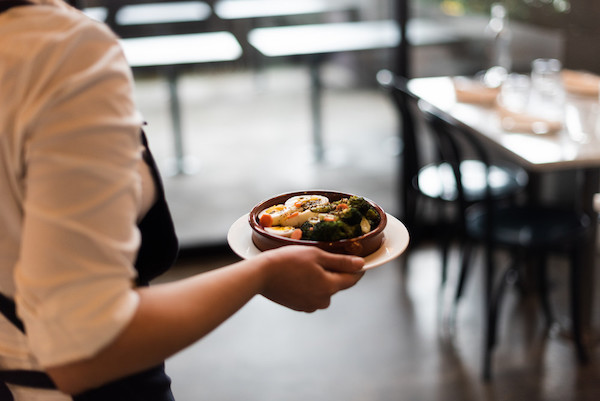Restaurant floors must meet certain standards defined by regulations as well as customer expectations. From cleanliness to safety and stain-resistant features, restaurants must address many daily challenges. At the same time, it may be necessary to factor in cost considerations. To help you make the ideal choice here are some tips for choosing an industrial flooring solution for a restaurant.
1. Choose a Solution That Creates Visually Appealing Waiting Areas
The waiting area should have a design that is calming and visually appealing. It is the one aspect of the restaurant you ought to focus on to create a memorable impression.
The waiting area must also meet industrial flooring safety standards. That means it must have anti-slip characteristics and be easy to maintain. An eye-catching and durable installation can make all the difference for your establishment.
2. Choose One That Invokes a Warm Ambiance in the Dining Area
For the dining, the design should be inviting and comfortable. One option ideal for the food industry is terrazzo flooring, known for its durability and aesthetics. Terrazzo is a cost-effective industrial solution for establishments in the food and beverage industry. You can create unlimited designs for a stunningly elegant floor for the dining area.
Terrazzo is an aggregate that may consist of marble, quartz, or recycled glass, amongst other materials. It offers an impermeable surface suitable for heavy-duty applications in industries and restaurants. The surface of a terrazzo tile can resist microorganisms and moisture.
3. Choose Something That Also Works for the Kitchen
The interior of the restaurant’s kitchen is often out of the view of the patrons. So, while durability is important, you can’t ignore aesthetics. You need a floor that can endure the heavy traffic as well as grease and oils but has anti-slip capabilities.
Vinyl tiles come in several many patterns and colors designed to mimic wood, natural stone, or ceramic tiles. In an environment with lots of foods and oils, vinyl is easy to clean and maintain. It is also one of the most cost-effective and versatile options for food industry applications.
4. Consider Ease of Installation and Maintenance
The nature of the operations in the food industry calls for durable and easy-to-maintain industrial flooring solutions. You can keep the floor in tip-top condition by promptly arranging for treatments. These treatments can prevent cracks, effectively stopping moisture from damaging the foundation. It is also important to consider ease or repair which may be necessary every few years.
Durable and Dependable Industrial Flooring Solutions
Durability is an important factor to consider when evaluating industrial flooring solutions. From heavy foot traffic to grease, oils, and organic matter, restaurant floors are subjected to spills and mechanical stress.
One of the best options for businesses in the beverage industry is polished and stained concrete. It has an additional layer of coating to prevent scratches, cracking, and staining.
The coat makes cleaning and maintenance easier, even for surfaces that experience heavy foot traffic. The surface may be treated with a variety of pigments to get the desired hue for the restaurant floor.
You should choose an industrial flooring solution that you can comfortably maintain. There are many types of floors suitable for a restaurant, but that will depend on your needs. You can find a durable floor that is durable, aesthetically pleasing, and easy to install and repair.


 Pamela began her professional career in the broadcast industry while attending Tarleton State University. After graduating with a B.S. in Speech Communication in 1997, she worked at several radio stations in management roles focusing on continuity, music and production as well as serving as an on-air talent continuously for more than ten years. In 2010, Pamela accepted a position as the Assistant Marketing and Development Director for the Eisemann Center in Richardson, TX. Helping to promote, market and develop the City of Richardson’s performing arts center, she succeeded in implementing and managing all social media marketing as well as creating and directing a first-ever student art exhibit, further strengthening her marketing and organizational talents.
Pamela began her professional career in the broadcast industry while attending Tarleton State University. After graduating with a B.S. in Speech Communication in 1997, she worked at several radio stations in management roles focusing on continuity, music and production as well as serving as an on-air talent continuously for more than ten years. In 2010, Pamela accepted a position as the Assistant Marketing and Development Director for the Eisemann Center in Richardson, TX. Helping to promote, market and develop the City of Richardson’s performing arts center, she succeeded in implementing and managing all social media marketing as well as creating and directing a first-ever student art exhibit, further strengthening her marketing and organizational talents. Jason Krueger is the Director of Ranch and Real Estate Development for The Project Group Consulting, LLC. Jason has been managing and developing ranches for greater than 14 years, and has extensive sales management experience in the construction industry dating back to the late 90s. He is also a Wildlife Biologist/Ecologist with a B.S. in Wildlife Ecology from Texas A&M University in College Station.
Jason Krueger is the Director of Ranch and Real Estate Development for The Project Group Consulting, LLC. Jason has been managing and developing ranches for greater than 14 years, and has extensive sales management experience in the construction industry dating back to the late 90s. He is also a Wildlife Biologist/Ecologist with a B.S. in Wildlife Ecology from Texas A&M University in College Station. Bryant began his career at Crepaco warehouse in parts distribution and pump assembly. Then he progressed to field installation for process and ammonia systems where he oversaw welding and fitting both sanitary tubing and ammonia piping systems.He then moved to San Antonio, spent a year as a contract fabricator with H-E-B Foods working for Sanitary Welding Services. At the end of his contract he returned to the DFW area with Alloy Equipment doing installation, crew management, and scheduling. There he remained through the buyout by Statco Fabrication and Engineering, which resulted in his 25 combined years with them moving into engineering and sales departments.
Bryant began his career at Crepaco warehouse in parts distribution and pump assembly. Then he progressed to field installation for process and ammonia systems where he oversaw welding and fitting both sanitary tubing and ammonia piping systems.He then moved to San Antonio, spent a year as a contract fabricator with H-E-B Foods working for Sanitary Welding Services. At the end of his contract he returned to the DFW area with Alloy Equipment doing installation, crew management, and scheduling. There he remained through the buyout by Statco Fabrication and Engineering, which resulted in his 25 combined years with them moving into engineering and sales departments. With more than 25 years in the food and beverage industry and extensive experience as a project manager, Tony has planned and led multi-million dollar projects relating to system upgrades, equipment installation, water quality, validations and process improvements. Some of his areas of expertise include project planning, quality assurance, process analysis, manufacturing systems, process design and problem resolution.
With more than 25 years in the food and beverage industry and extensive experience as a project manager, Tony has planned and led multi-million dollar projects relating to system upgrades, equipment installation, water quality, validations and process improvements. Some of his areas of expertise include project planning, quality assurance, process analysis, manufacturing systems, process design and problem resolution. Tim is an electrical and control systems engineer with more than ten years of experience in a wide variety of industries. Project experience includes working with clients in the water/wastewater fields, pharmaceutical, cosmetics and food and beverage industries. Prior to his engineering work, Tim was a licensed water treatment plant operator in Texas. Tim’s strengths are process engineering, control system design, conveyor system design, and project management. He received his B. S. in Electrical Engineering from the University of Texas at Arlington. In his spare time, Tim enjoys working on cars, golfing, and billiards.
Tim is an electrical and control systems engineer with more than ten years of experience in a wide variety of industries. Project experience includes working with clients in the water/wastewater fields, pharmaceutical, cosmetics and food and beverage industries. Prior to his engineering work, Tim was a licensed water treatment plant operator in Texas. Tim’s strengths are process engineering, control system design, conveyor system design, and project management. He received his B. S. in Electrical Engineering from the University of Texas at Arlington. In his spare time, Tim enjoys working on cars, golfing, and billiards. Michael has thirty-five years of diversified experience in project management and engineering, equipment and systems design, and manufacturing and production. Michael holds a Bachelor of Science degree in Mechanical Engineering from Texas A&M University.
Michael has thirty-five years of diversified experience in project management and engineering, equipment and systems design, and manufacturing and production. Michael holds a Bachelor of Science degree in Mechanical Engineering from Texas A&M University.